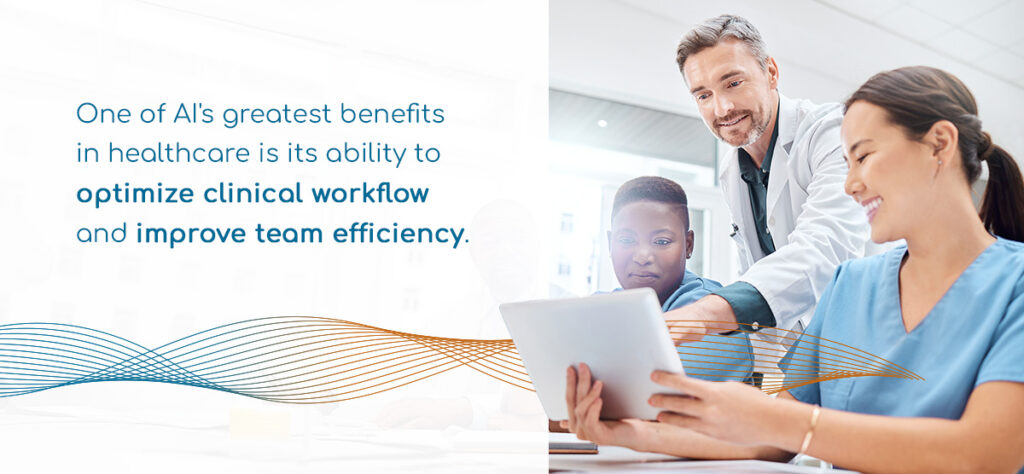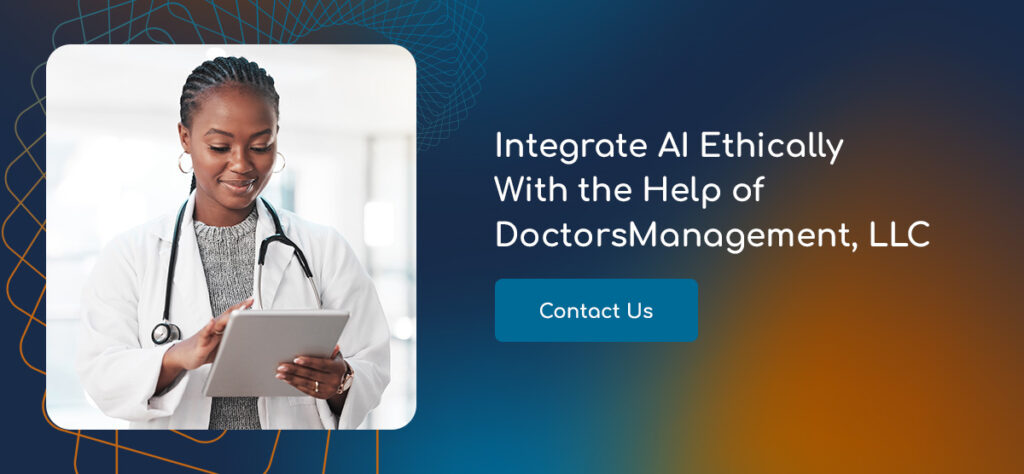Artificial intelligence (AI) in healthcare involves using technologies like machine learning, deep learning, natural language processing, and more to enhance the experience, outcomes, and processes for both patients and professionals. AI systems’ extensive capabilities can help health professionals make quicker and more accurate diagnoses and locate patients’ health records for timely treatment options.
Healthcare professionals use AI for data processing and predictive abilities to manage and improve the efficiency of their practices.
How Can AI Streamline Healthcare Operations?
Artificial intelligence in healthcare has the potential to make patient experiences more personalized, interactive, and preventive. It helps healthcare professionals and medical practices improve patient satisfaction and streamline operations for efficiency and accuracy. Here are the top ways that AI can enhance healthcare processes.
Improves Patient Outcomes
Integrating AI into healthcare operations can facilitate more efficient diagnostic services. It helps practitioners reach faster diagnoses by allowing them to access information more quickly. A faster diagnosis means patients can get treatment earlier, which may improve outcomes for many conditions. Research shows that early detection plays a significant role in reducing healthcare costs and mortality from disease. It also improves quality of life, elevating patient outcomes across the board.
AI can analyze vast data libraries in a few minutes, paving the way for early detection of viruses, diseases, and other conditions. It can help practitioners identify early — and often-overlooked — symptoms to improve patients’ chances of overcoming their ailments. Studies show that using AI systems during colonoscopy screenings resulted in a 50% reduction in missed rates, allowing patients to get treatment earlier.
Integrating AI into healthcare operations can offer comprehensive insights to professionals, which helps them deliver more personalized treatments and reduces the load on exhausted ER centers by addressing symptoms early on.
Reduces Staff Burnout
Healthcare practitioners are at risk for burnout, especially those who take on high-demand roles. Staff burnout can lead to disengagement, poor patient satisfaction, and increased errors. AI can relieve the workload by assisting with some repetitive, tedious tasks. It allows workers to focus more on patient-facing duties.
Here are the ways that AI can help reduce staff burnout:
- Lowered administrative strain: The administrative burden placed on healthcare paired with the physical and emotional toll of the day-to-day can cause them to feel burned out. AI integration helps automate routine administrative tasks. Healthcare practitioners can focus more on patient care by offloading time-consuming, mundane inquiries and appointment-related tasks onto AI systems.
- Enhanced automation for documentation: Healthcare workers go through piles of daily documentation, which is a significant contributor to burnout. AI tools can streamline and automate the tedious documentation process. Natural language processing enables practitioners to dictate recommendations, notes, and care plans into automated electronic health records. It frees them from repetitive and time-intensive manual data entry.
- Improved decision support: Healthcare workers are confronted with myriad symptoms and complicated cases that require accurate and quick decision-making skills. AI can drive evidence-based decisions by providing adept literature with speed and relevance. This benefit reduces the time that practitioners spend on manual analysis and aids in reaching a more efficient, research-backed diagnosis. AI reduces the cognitive load on healthcare workers and helps them reach more focused diagnosis and treatment plans.
Enhances Team Coordination

One of AI’s greatest benefits in healthcare is its ability to optimize clinical workflow and improve team efficiency. One example is AI medical scribes, an intelligent software program that automates the documentation process between practitioners and patient interactions. This AI software updates the electronic health records (EHRs) in real time, keeping the team up to date on patient records.
AI solutions like chatbots and assistants can facilitate information exchange and help staff members coordinate to better meet patients’ needs. They also assist workers in keeping track of inventory, such as masks, gloves, and other general cleaning items, which ensures they have the items they need daily. Integrated AI systems can help schedule appointments and allocate tasks and resources based on priority and availability, which may prevent conflicts over shared resources.
Potential Disadvantages of Using AI in Healthcare
AI has the potential to effectively streamline various processes and operational tasks. However, it has its limitations, and understanding them can help medical practices remain aware of the risks involved. Here are the key disadvantages of AI in healthcare:
- Social variables: AI isn’t able to discern a patient’s economic, personal, or social preferences. It requires human oversight to ensure their rights are respected and applied to their treatment and care.
- Inaccurate information: Small datasets or inaccuracies for specific illnesses, environmental factors, or demographics can result in AI misdiagnosing patients. Healthcare professionals must be wary of overreliance and adjust to potential gaps in the data.
- Security concerns: This technology requires connection to the Internet, increasing the risk of cyberattacks. These intrusions can shut down AI and expose patients’ private information if you don’t invest in effective cybersecurity.
- The human element: Human doctors can develop bonds with their patients and offer them empathy. AI can only exercise logic and won’t consider their feelings toward particular types of treatments.
How to Balance the Use of AI With a Human Touch
While AI is a useful tool to help medical practices, it does not replace the experience, knowledge, and human touch of staff members. It also makes compliance more challenging since businesses have to prioritize patients’ privacy and security. It’s best to use AI systems while consulting with a reliable partner to maintain compliance.
The future of AI in healthcare depends on finding harmony between AI and the human touch. To achieve this, consider the following factors to ensure it aligns with your medical practices’ values and goals:
- Patient needs
- Practice-specific challenges
- Patient data security and privacy
- Ethical use of AI
Integrate AI Ethically With the Help of DoctorsManagement, LLC
Integrating AI into healthcare practices helps boost efficiency, reduce burnout, and improve outcomes. However, compliance is crucial for maximizing these benefits and protecting your patients. Meeting the necessary regulations can be challenging without the right support.
At DoctorsManagement, LLC, our consultants have the expertise and knowledge to help medical practices implement AI systems while still maintaining compliance.
Our consulting services help your practice manage operational tasks more efficiently. We’ll provide practice assessments and implement strategic plans to help your team optimize workflows and leverage AI more effectively. Our Health Insurance Portability and Accountability (HIPAA) compliance training program will educate staff to remain compliant even in complex situations.
Please contact us for a free consultation and get more information on how we can support you. We’ll help you worry less about compliance and focus more on making a positive difference in your patients’ lives.

























